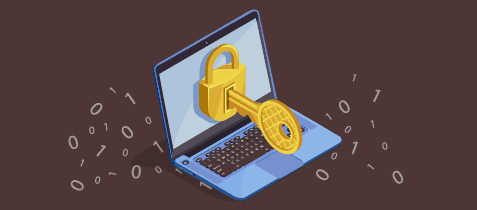Contents
7 ways to protect your law firm from a cyber-attack
If I were to ask you what your highest value business asset is, other than your staff and colleagues, what would you say? The employees’ cars parked by your office? Your hardware? Your offices? Your library? While those may be important assets, there is one that is far more vital: your data.

Every decision you make is reliant on the data you hold. If you’re in any doubt about its value, consider turning up to work tomorrow with no data to use. You would have no emails in your inbox, no information on your PMS, no financial records, no telephone numbers in your call directory and so on. How would you run your firm and serve your clients?
Protecting your data is crucial to your firm’s success. The effects of a data breach or loss of data would have huge implications for your customers but also for your bottom line. On top of the lost business and damaged reputation, you’ll also face hefty fines from the General Data Protection Regulation. GDPR fines are now forty times greater than the maximum penalty of £500,000 under the Data Protection Act 1998. Companies can now face up to £20 million or 4% annual turnover, whichever is highest, if laws are breached. A scary thought when the Cyber Security Breaches Survey showed 43% of businesses in 2018 were witness to a breach or attack. Therefore, taking control of your data security and implementing effective cyber security processes should be a priority for all firms.
What is cyber security?
Cyber security’s main function is to protect your data from theft and prevents unauthorised access to your personal information. Cyber security helps to reduce the risk of a cyber-attack on your organisation to ensure your sensitive client and employee data is secure.
Cyber criminals look to target businesses and individuals for weaknesses in their system. The criminals look to exploit a person or organisation to gain valuable information or money. One way a cyber criminal can attack your firm is by sending out phishing emails. A simple click on an attachment or details filled out in an unsecure link can quickly lead to a ransomware attack. According to CybSafe analysis, 90% of cyber data breaches in 2019 were caused by human error.
A ransomware attack is when a piece of code, downloaded from an unsafe attachment, encrypts your company data. This means that your data will be inaccessible by you and a ransom is sent by the attacker to unlock it. Often, cyber security isn’t prioritised in small business because no one holds responsibility. Fee earners, administrators, managers, and partners believe it’s the job of their tech support team.
And the tech support team rely on the training of the firm’s staff to keep their data secure. Therefore, a clear cyber security policy and plan can help outline the key responsibilities for everyone involved and ensure the right software is implemented to combat breaches.
Why is cyber security important in the legal sector?
Even outside of the workplace, the devices and online services we use – computers, smartphones, emails, online shopping and banking etc. – are a fundamental aspect of our daily lives. The Cyber Security Breaches Survey found 98% of businesses rely on digital tools for service and communication and in 2020, 84% of UK adults owned a smartphone. It’s impossible to imagine how we’d function without technology, so protection our devices and the information we store on them is crucial.
For law firms, the stakes are higher, as your reputation is on the line. Cyber criminals view law firms as a prime target because they know you hold high-value assets. Perhaps your firm holds key details of a criminal law case or highly confidential information about a high-profile celebrity. Cyber criminals are also aware that firms typically hold large amounts of money and could pay a ransom.
Reputation is important to the success of any law firm and that’s why cyber criminals will be keen to target you and your employees.
What is your cyber security maturity level?
The first step to becoming more cyber secure is to review your current solution and protection methods. To get a better understanding of how protected your firm is you can measure your cyber security maturity level.
When measuring your firm’s cyber security maturing level, there are typically five levels of maturity that your firm can be measured in; the lower the number, the weaker your firm’s cyber security is. There are various maturity frameworks that can be used to guide your assessment including the Cybersecurity Capabilities Maturity Model (C2M2) or the Cybersecurity Framework. Using a maturity level provides the insight you need to make improvements. To determine your level of cyber security maturity, you’ll need to run a risk assessment that will identify the assets that may be affected if your firm is the victim of a cyber-attack. These will include your hardware, software, customer data and much more.
It is vitally important to regularly check and monitor your working environment for any changes and continue to carry out risk assessments to ensure your firm is always protected. Cyber criminals, hacking tactics, and technology are always changing and adapting, so it’s important that regular reviews are completed so you’re not caught out.
The cost of a cyber-attack
But what would happen if your firm was the victim of a cyber security breach?
- Increased costs due to replacing broken equipment or renting hardware as an interim solution.
- Reduced income whilst you’re locked out of your data and unable to operate.
- Damaged reputation for breaching your clients’ data which will affect your ability to win new clients.
- Lost data if the attackers stole your information and you didn’t keep backups. This is a time-consuming process to recuperate your client database, files history and practice reports which results in further lost time and income.
- Expensive fines for the SRA and GDPR policies that have been breached.
Law firm cyber security: 7 tips & best practices
The consequences of being the victim of a breach may look bleak, but there are ways to prevent it. Better yet, they aren’t that difficult to implement into your firm and will give you the peace of mind you need.
- Passwords
Most breaches are simpler than you may think. An individual guessing your password is one of the most common ways businesses are at risk. Enforcing a strong password policy is the easiest way to protect your staff and your data. In 2019, the National Cyber Security Centre (NCSC) reported that 23.2 million of breached accounts were using “123456” as the password. Ensure your staff use only strong passwords that include a mix of upper and lowercase letters, numbers, and special characters to increase security.
2. Two-factor Authentication
It is highly recommended that your firm implements Two Factor Authentication (2FA) for as many logins as possible. 2FA means that logging into an account requires two steps to prove your identity and grant you access.
One example of this is to put in your password, as well as getting a code sent to your smartphone that needs to be entered as well. Find out how you can use Osprey Approach and Google Authenticator to keep your data secure
3. Implement a data & cyber security policy at your firm
Most breaches (85%) are caused by human error (according to Tessian’s Human Error Report) and so creating a policy that is clear and easy to follow will help to educate and protect your employees, therefor your business. As part of the policy ensure to prioritise regular team training, document requirements such as 2FA where possible, and identify best practices to follow, such as strong passwords, to stay secure.
4. Cyber Security Training
Just like our bodies, preventing a problem is better than trying to find a cure for it. You might be surprised to learn that breaches can often occur due to mistakes made by members of staff, such as an employee sending sensitive information to the wrong recipient or by clicking a link in an email from an unknown contact.
Being aware of cyber security is vitally important, especially as new methods to breach security will always be a looming issue. Taking a training course on the subject is important to ensure staff are kept up to date on the latest best practices.
One example of a cyber security training course is provided by the National Cyber Security Centres (NCSC). They offer a wide variety of awareness courses perfectly tailored for anyone who is new to cyber security by offering a thorough foundation on the subject.
5. Upgrade your hardware
Keeping your devices, applications, and technology up to date is a necessary step in protecting the data on your computer. Cyber attackers always try to find workarounds and breach points in the latest software version, which is why software updates are important as they prevent this from happening by implementing fixes. Avoid using old computers with outdated operating systems as they’ll no longer receive updates and as such, cannot be protected from a breach.
6. Mobile Device Management (MDM)
More of us have business data on our mobiles than we realise. Unlike a desktop, phones and tablets are much more likely to be misplaced or stolen. How many times have you muttered the words ‘where’s my phone?’.
Let’s say you go for a drink after work an accidentally leave your phone at the bar or in a cab on the way home. You do have a pin on the device, but it’s a simple to crack pin like 0000 or 1111, meaning your phone is unsecure. If someone were to pick it up, who’s to stop them for plugging it into their PC and gain access to the root folders?
There are ways to prevent such an occurrence though by using a method called Mobile Device Management (MDM). MDM offers higher levels of security, such as disabling Bluetooth access, 8-character pins and the option to wipe company data remotely. It isn’t expensive to implement and comes with an enterprise package from Microsoft Office 365.
7. Choosing a cyber-secure practice management solution
Data security is something to take very seriously. Regardless of where you work, whether it be at your office or at home, there shouldn’t be any difference in the way you access, protect, and use your data.
When using Osprey Approach we require the use of strong passwords with 2FA, no matter if you’re using a secure network or 4G on the go. Osprey is securely hosted in our data centres which means the data you store in Osprey is secure too. Data isn’t stored on your local device, so even if you don’t have MDM implementation, take comfort that it is safe and secure in our UK data centres, which are ISO27001 compliant.
With synchronous replication and dual feeds, your data is always available to you and hosted on industry leading data centres with 24/7 security, InfaRed perimeter fencing, CCTV and biometric entrances / exits. Needless to say, the physical location of your data couldn’t be more secure.
Conclusion
Managing your data and ensuring your firm is cyber secure can feel overwhelming. However, there are plenty of solutions you can implement that will increase the security of your firm including staff training, password policies and software updates. So don’t take the chance that a cyber-attack won’t happen to your firm and protect your data with the best technology solutions on the market.




